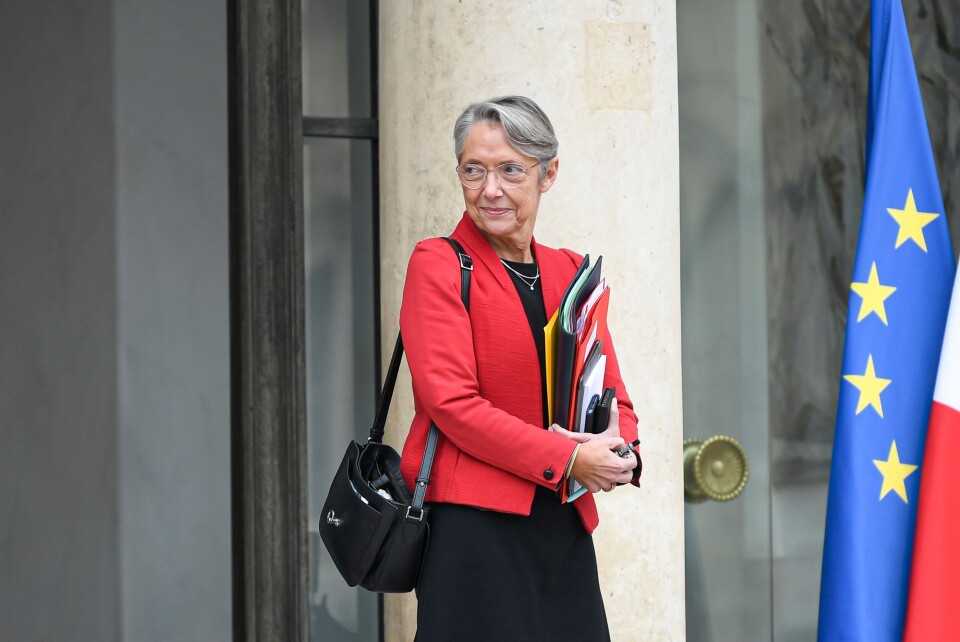-
French crisps brand gains global attention after Dua Lipa post
Singer posted photo of her shopping basket and the only food items were Brets crisps in braised chicken, honey mustard, and ‘Fromage du Jura’ flavours
-
Why supermarkets are urging shoppers to buy French leeks
Try our French classic leek vinaigrette recipe
-
New bill targets skiers under influence of alcohol or drugs
There are not currently any specific rules on skiing while under the influence
What are the key parts of the French government’s 100-day action plan?
The plan is seen as an attempt to move on from France’s controversial pension reforms

French Prime Minister Elisabeth Borne has put more flesh on the bones of the government’s 100-day action plan.
It was announced earlier this month by President Emmanuel Macron and widely seen as an attempt to move on from the country’s controversial pension reforms, which will see the minimum retirement age raised from 62 to 64.
“Every decision that we take must solve a problem, and improve daily life,” said Ms Borne “I only believe in results.”
The aims include:
- Reaching full employment
- Reindustrialising France
- Planning and speeding up the ecological transition
- Build and re-establish public services
- Strengthen republic order and encourage public engagement
The announcements were the first official policy pledges made since Ms Borne and her government narrowly survived a vote of no-confidence in the French parliament. It followed the shock passing of the pension reform bill via the controversial article 49.3.
Read more: French PM survives two no-confidence votes over pension reforms
Read more: Five takeaways from Macron interview to mark a year since re-election
1. A ‘pact for working life’
Ms Borne said the government wanted to work with social partners and unions to establish what she called a new "pact for life at work".
This will include plans to improve workers’ income, improve working conditions, prevent professional burnout, and develop employment for senior citizens.
The prime minister highlighted that the minimum wage (Smic) is set to increase by “more than 6%” in the next year.
2. An employment law
A full employment bill is to be presented by the government at the beginning of June, Ms Borne said.
This will focus on the ‘France Travail’ organisation, which is set to replace the current unemployment office agency, Pôle emploi.
Ms Borne said: "We want a more efficient public employment service."
3. A legal project on profit sharing
The PM confirmed that parliament would require smaller companies to offer a value-sharing scheme.
She said: "This is an important text. Until now, only companies with more than 50 employees were obliged to offer a value-sharing scheme to their employees.
"This agreement will make it possible to reach all SMEs by lowering the threshold from 50 to 11 employees for a period of at least five years."
The bill is set to be discussed before summer, she said.
4. No immigration law in the immediate future
Ms Borne said that a new immigration bill, set to be presented by President Macron, would be forthcoming, but not immediately.
She said: "Today, there is no majority to vote for such a text, as I was able to verify yesterday when I spoke with the leaders of Les Républicains. We will therefore continue discussions to find a way forward with the bill.”
She said that it would likely be presented in the autumn.
Read also: Eight key takeaways from landmark French immigration study
5. A ‘border force’ in the Alpes-Maritimes
Ms Borne said that "from next week” there would be “150 additional police and gendarmes in the Alpes-Maritimes", as part of an experiment for a stronger ‘border force’ at the Italian border by the summer.
"It will work more closely with internal security forces, customs officers, and the military,” she said. “Its implementation should be effective within six months.”
6. A climate and energy law coming in autumn
The PM said that a draft "energy and climate" law would be presented in the autumn. She said: “We will present an overall vision of our action, with a multi-year energy project.”
She said that the action plan would have “direct consequences on the lives of [people in] our regions and our communities. We want to work with them to adapt these levers to the reality of each area, to remove the obstacles that prevent us from speeding up [the ecological transition] today, to simplify procedures, and release funding."
7. Aid for renting individual cars from autumn
As part of a commitment made by President Macron, Ms Borne said that the government wants to make it easier for everyone to access their own vehicle, by setting up a rental offer.
She said: “We will launch a rental offer for individual vehicles at affordable prices in the autumn.”
8. Extra nurse training places
Within the context of a shortage of healthcare personnel, Ms Borne pledged to speed up the recruitment of health professionals in hospitals.
She said: “Health insurance will finance the recruitment of 6,000 additional medical healthcare assistants. This will mean there will be 10,000 in total, which will free up doctors' time.”
Some 2,000 additional places will also be opened in nursing training institutes, she said.
"This is an increase of 4,000 places in two years and will mean many more nurses in the next few years,” she promised.
Read also: The cost of seeing a doctor in France is set to increase
Related articles
Reignite or fizzle out? What next for France’s pension reform strikes?
























